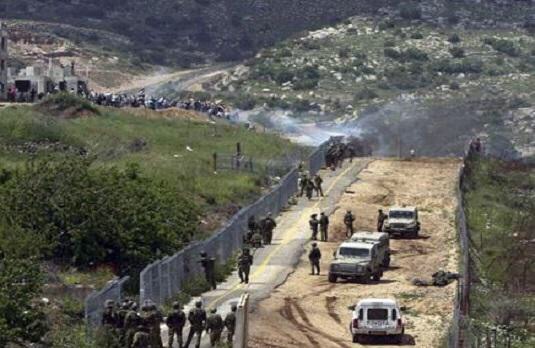The Zionist entity lives a state of confusion and anxiety as a result of developments on the border with the occupied Golan, especially that the armed groups are no longer able to protect itself in this region
The Zionist entity lives a state of confusion and anxiety as a result of developments on the border with the occupied Golan, especially that the armed groups are no longer able to protect itself in this region.
 The Israelis, according to analysts, are afraid that the conflict in the South would be transferred to the Golan as this would lead to military and economic losses and a comprehensive war.
The Israelis, according to analysts, are afraid that the conflict in the South would be transferred to the Golan as this would lead to military and economic losses and a comprehensive war.
The Syrian army was gaining ground after its offensive in Syria’s southern Quneitra and Deraa provinces as the Zionist entity was watching with some unease the offensive underway a few kilometers to the east from its frontline on the Golan.
The Israelis are also terrified that Golan may be a new front that would put the entity before an unexpected reality.
Last October, Israeli Defense Minister Moshe Yaalon told Haaretz newspaper that the Israeli army was providing humanitarian assistance, such as blankets, food and medical aid, to some terrorist groups in the Golan.
Israeli assistance to militant forces includes the provision of weapons and tactical intelligence. Last week, Syrian Foreign Minister Walid al-Moallem said the “popular uprising” in the Golan had thwarted Israeli attempts to establish a buffer zone in the area.
In a puzzling and unusually provocative action, Israeli drones fired missiles near Qunaitra on Jan. 18 killing six Hezbollah fighters, including two field commanders, and an Iranian general. Hezbollah retaliated to the Qunaitra strike by targeting an Israeli army convoy with anti-tank missiles, killing two soldiers.
Israel has not claimed responsibility for the attack on the Hezbollah convoy although its drones were spotted by UNDOF peacekeepers.
Zvi Barel, a veteran Israeli commentator for Haaretz, wrote last week that ‘Israel’ will accept Syrian militants on the Golan, but the presence of Hezbollah and Iranian forces would be considered a “strategic turning point” and likely be met with “violent Israeli resistance.”